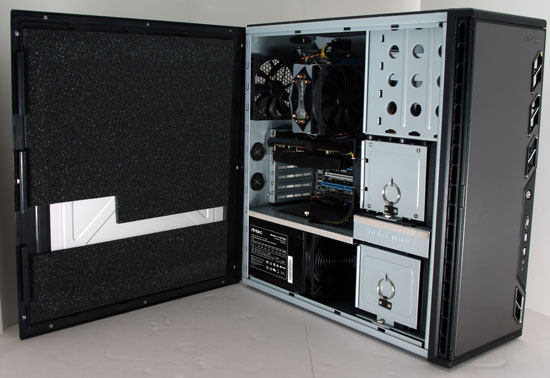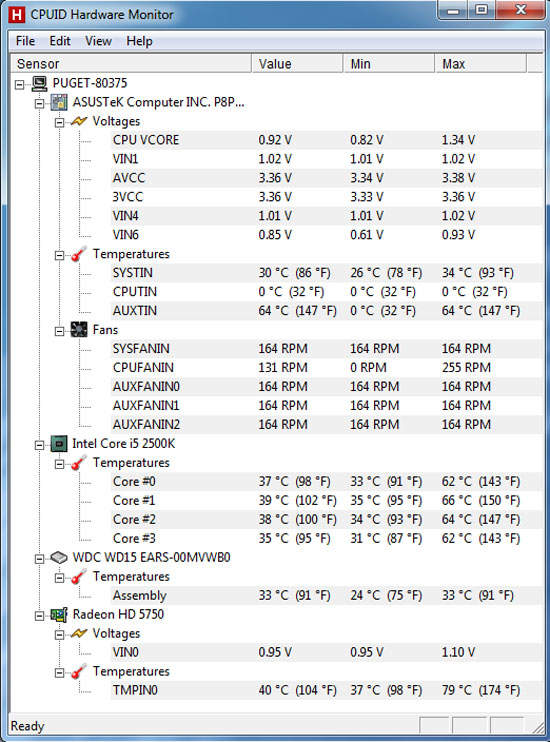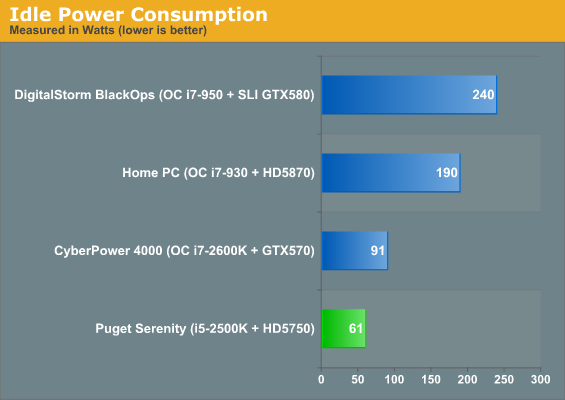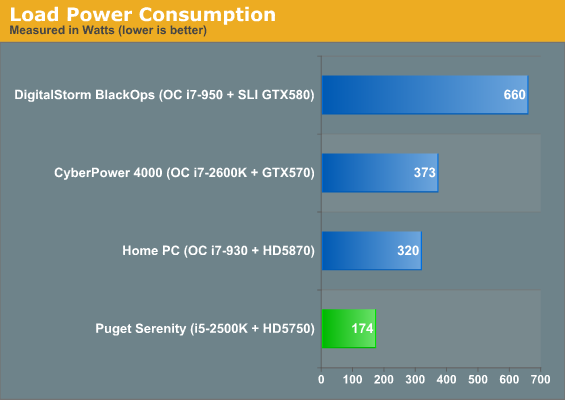Puget Systems Serenity SPCR Edition: Blissful Silence
by Dustin Sklavos on February 10, 2011 12:00 AM EST- Posted in
- Systems
- Intel
- Radeon
- Sandy Bridge
- Puget Systems
- Serenity SPCR
Build, Noise, Heat, and Power Consumption
Given the somewhat exotic nature of Puget Systems's Serenity SPCR Edition tower, it's reasonable to assume that there just aren't any good corners to cut. I'm happy to report that, having examined the system, Puget Systems simply couldn't and didn't.
What makes the build particularly interesting compared to the others is that, as I mentioned in the introduction, this really is a custom build, not just a melange of carefully chosen and assembled parts. Take a look inside and see what I mean.

Seeing the additional foam padding on the inside of the side panel when I had to remove the internal packing was a major cue, and the foam has been carefully cut to fit around the internals of the Antec P183 case used for the build. From the photo you can see three major points in Puget Systems's favor: quality case, quality power supply, and additional custom sound dampening. What's harder to see is that Puget Systems removed the Antec Tricool fans from the case and replaced them with silent Scythe 120mm fans. They've also bracketed an additional fan to the top hard drive tray, and they've removed the top exhaust fan and covered the vent with foam.
Another interesting point is the use of an air cooler instead of a watercooling system on the processor. I've reviewed more desktops with watercoolers than not and they're generally considered among the quietest ways to go, but here Puget Systems opts to use an air cooler—the Gelid Tranquilo—with a silent fan. They also carefully tuned the fan speeds in the ASUS board's UEFI to ensure silent running.
Certainly building the entire system for low noise is going to mean running a little hotter than normal, though, right? Interestingly, that's not the case.

Check out those thermals. The Serenity SPCR Edition keeps everything running remarkably frosty, and that's due in no small part to the attention paid to airflow inside the case. The P183 was already an excellent case with great thermals (we actually have a review unit on hand and we'll be posting a case review in the coming months), but the modified cooling produces airflow moving in effectively a straight line through the tower with minimal turbulence, allowing the fans to run at low speeds without compromising thermal performance. Even the Radeon doesn't crack 80C.
With those temperatures and the system's configuration in mind, these power consumption figures should come as no surprise to you:


We tested power consumption by idling at the desktop, and then running our Left 4 Dead 2 timedemo. In my experience, very few games are capable of pulling as much power from a system as Left 4 Dead 2 can. Something about the Source engine's relatively frugal usage of graphics hardware lets the processor and video power consumption scale well together.
Under load, Puget Systems's Serenity SPCR Edition draws less power than my fairly frugal desktop does at idle. Sandy Bridge has proven to be stunningly power efficient in the testing we've been able to do (we really can't wait to get our hands on more Sandy Bridge-equipped notebooks), and combining that with the already efficient Radeon HD 5750 keeps power consumption low. The next system up on the list—my home tower—draws nearly twice as much power under load. That increase in power draw may be commensurate with the increase in gaming performance, but keep in mind the i5-2500K is able to handle processor-intensive tasks much more efficiently than the i7-930.
















139 Comments
View All Comments
PartEleven - Thursday, February 10, 2011 - link
Oh I'm not assuming. I know.You suggested using an Asus 6870 DirectCu. At stock settings. SilentPCReview measured the sound of the Asus EAH6850 DirectCU @ 15db idle. That's 50% louder than this system. Try again.
erple2 - Thursday, February 10, 2011 - link
Why spend 1+Million dollars on a Bugatti Veyron when you can buy an inexpensive Hyundai to drive from point A to B? They Hyundai will even carry more people than the Bugatti. It'll also get substantially better Gas Mileage. In stop and go traffic, you won't be able to tell that the Bugatti can go zero to ludicrous speeds faster than the Hyundai can get to 60. Does that mean that the Bugatti is be sold? Clearly, you're not the target market.You're comparing apples to oranges. In just about every instance in the world, optimizing for one specific vector (in this case, actually silent operation) tends to drive the cost up exponentially beyond a certain point. You as the consumer have to decide whether that cost is worthwhile. Do $50,000 speakers sound better than a $5000 speaker? To someone willing to spend that much, it might (protip - generally only highly trained ears can tell the difference). Does that mean that I'm the target market for a 50k speaker? No. I don't have a highly tuned and trained ear (though I'd be willing to bet that many people that buy the 50k speaker also don't have trained ears, but that's another discussion).
Ultimately, your computer will be faster. But it will also be louder. And may not be as well assembled (though that depends on your skill level). Plus, if you have any problems with your computer, you get to call the 12 different manufacturers of each of the components to get it fixed.
strikeback03 - Friday, February 11, 2011 - link
Another parallel is that if you are going to drive the Veyron legally and only on public roads, the only thing it does better than the Hyundai is draw attention. None of its strengths are evident in that usage model. This computer system seems similar - outside of some specific circumstances (music recording, theater use) the average user doesn't have a quiet enough workspace that the difference between an 11dB system and a 20dB system matters. So the biggest benefit would be the ability to brag in forums about your 11dB system.It would be interesting to see if purchasing these same components (minus the custom foam and such) off the shelf and assembling would produce a system that is still inaudible in the majority of homes.
nikclev - Thursday, February 10, 2011 - link
While I don't dispute that the corsair AX 850 is a great PSU, I disagree that it is much better than the CP-850. They are both great PSU's, the antec has slightly less ripple and the corsair has slightly better regulation according to johnny guru. With only performance in mind, they are both excellent PSU's.The antec is only usable in certain antec cases, but is around $120 retail. The Corsair is around $200 retail. With value in mind, the antec is a much better psu than the corsair IF you have an antec case to put it in.
PartEleven - Thursday, February 10, 2011 - link
What the title says. I've noticed more than a few comments on this article from people interested in a tech site that reviews parts for their quietness to help them build a silent gaming machine. That's pretty much exactly what SPCR does. Go check them out!And if you've already checked them out and wrote them off as ridiculous or useless, I'd like to know why? Why are all of their reviews invalid? Why are they so terrible? Why, if they provide the kind of analysis some people want so much, are they still ignored so much?
Just curious.
KayDat - Friday, February 11, 2011 - link
I suspect most people don't really understand the difference between 'quiet' and 'silent'. Most people grew up and live around noisy PC's, where anything that isn't a blow dryer is reasonably quiet. Perhaps many don't understand the implications of quiet computing? Of course, technically the Puget SPCR build isn't really 'silent' either, but for practical intents and purposes, it is.Of course, quiet computing is a slippery slope; once you start, there's a good chance you won't be satisfied until you reach silent, as each time you lower the noise floor, you become accustomed to the noise, and feel like going for more (that is, less noise ;)
BTW, nice seeing other SPCRers kicking around on the net, PartEleven =]
Dug - Thursday, February 10, 2011 - link
What I don't think most of you understand is that a majority of people have no interest in building or setting up a computer. What these guys do is an art and they have the experience to do it correctly.If you walk down the street I'll bet there may be 1 in a 1000 people that actually build there own.
So the price they have is not bad for the experience, attention to detail, and support.
Sure parts can be bought separately for less, but this can be said about anything.
You can put together a car for less than buying one made by a manufacturer, but how many of you go and do that?
How many of you have had to take calls from family members or friends. You may think its no big deal, but if you made something for them, you are responsible. And believe me, tech support is no fun and its not cheap. Not to mention running web site, ordering products, marketing, etc. This is a small business for higher end clients.
To go from 11dBA at idle to 12 dBA at full load is no easy feat. Most of you building your own don't care about that subtle difference, but I know a lot of people that do.
I think they've done an outstanding job and should be commended for bringing this type of machine to market.
bigbob123456 - Thursday, February 10, 2011 - link
Give me 6 hours and I'll put this same system together and only charge you $180 in labor, since that's what I currently make in 6 hours. It's one thing to put a car together from scratch, but a sound proofed computer needs little more than a screwdriver, some adhesive, and time. Therefore your analogy is terrible.Furthermore the other costs you mention, website, parts, marketing, tech support, etc are largely capitalized long term expenses and distributed over the sale of money systems. No matter how you spin it, this system is overpriced and not built as well as it could be (quality + part selection)
KayDat - Thursday, February 10, 2011 - link
I really think people here don't understand the true meaning of 11dB. It is for all intents and purposes, silent. The average bedroom at night sits at around 30dB. 11dB is FAR below the sound floor of most situations.Is this system something that everyone needs? Probably not. But some do, and it is desirable to others.
You make it sound like Puget sit on their hands and charge people for them to do it; silent computing isn't as simple as screwdriver, adhesive and time. Your argument that "this system is...not built as well as it could be" also falls short; the AT review affirms many times that this is a solid machine, and that Puget did a top notch job. Their parts selection aren't aimed at 12yo ricers or the average gamer, but those looking for a silent computer.
Would I buy this computer? Probably not. Neither would the majority of the AT readership. Sure, I could buy all the identical parts, and put together a system that might be fairly quiet, but it probably won't reach 11dB, EVEN WITH IDENTICAL PARTS. There are batch differences in all computer parts, from fans to motherboards and graphics cards, resulting in different sound profiles and electrical noise. Puget spend time hand picking their parts, ensuring you get a quietest parts. If you're interested in silent/quiet computing, I suggest you come visit SPCR and spend some time reading some of their articles and posts in the forums.
Dug - Friday, February 11, 2011 - link
You forgot a lot of things.You have to research the parts and test to make sure you can claim that 11dba
You have to use your own money to order the parts.
Unpack everything and put it together.
Hope that the parts you ordered work- oh wait one doesn't so you have to spend the time for rma.
Now install Windows and all updates- install things like flash, adobe reader, etc.
Test- test- test. Because you don't want to find out 2 hours later the ram isn't good, certain fan isn't at spec, etc
Supply set up instructions.
Now package everything up and set up shipping.
Hope that you aren't scammed from a bad visa.
And last, are you going to provide 1yr support for that $180 when the person doesn't know how to plug in the mouse?
Now you have to pay for rent, electricity, water, payroll, taxes, advertising, etc.
Good luck on only chargin $180 profit. You won't make it long.